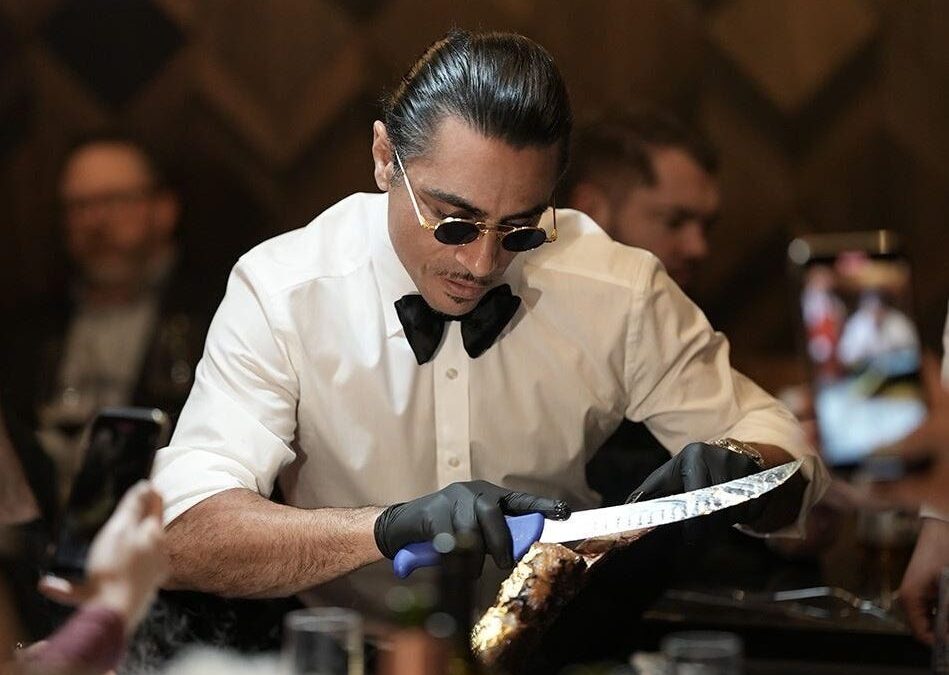
by lspeed | Feb 22, 2026 | BLACK BOX: RANTS, RAVES, REVIEWS & RECIPES
The word hospitality sounds warm, fluffy, and faintly scented with fresh linen. In reality, its origins are far more practical and life saving. Hospitality comes from the Latin hospes, which meant both host and guest. One word, two roles, and utterly confusing – but it gets better. Closely related is hostis, which originally meant stranger and later evolved into enemy.
So yes, hospitality began as a system for dealing with people you did not know and were not entirely sure would behave themselves. The original idea was simple. Strangers arrive, you feed them, give them shelter, establish rules, and everyone survives the night. This was not kindness, just practical risk management.
In ancient Greece, this system was called Xenia. Guests were fed and cared for before anyone dared ask awkward questions like “who are you” or “why are you here with that sword”. Zeus himself supposedly protected guests, which was divine encouragement not to poison anyone at dinner. Breaking hospitality rules was not just rude, it was considered a cosmic mistake.
The Romans, never ones to leave things informal, turned hospitality into a structured social contract. Hosts and guests exchanged tokens, promises, and obligations that could last generations. Imagine checking into a hotel today, and being told your grandchildren were now legally obliged to invite the owner’s grandchildren for lunch.
Meanwhile, Asian cultures had perfected hospitality to both an art form and a social minefield. In much of East Asia, hospitality revolves around ritual and restraint. In Japan, guests are offered tea, silence, and immaculate order. The unspoken rule is that everyone must pretend not to be a burden while actively trying to outdo each other in politeness. The guest apologises for arriving. The host apologises for the house not being perfect. Everyone bows, and no one relaxes until dessert or next week.
China takes a more robust approach. Hospitality means feeding guests until they can no longer stand, then insisting they eat more. Refusing food is polite, and insisting harder is mandatory. The host worries you are starving, while guests worry they will never fit into their trousers again. This is considered a successful evening and the beginning of a mutually beneficial relationship.
In Southeast Asia, hospitality often comes with warmth, spontaneity, and zero personal space. You are not a guest for long, but family. Family sits down and eats, then asks and answers personal questions within the first five minutes. Declining food is suspicious, and declining a second serving is a declaration of war.
But all across Asia, one rule remains consistent: a guest must be looked after. Comfort is important, but dignity – the famous “face” – matters more, and for both sides. Hospitality is not about showing off, but about not embarrassing anyone, especially yourself.
Over time, hospitality moved indoors and donned uniforms. Inns became hotels, and hosts became staff. Guests became customers, with online reviews and strong opinions about pillow firmness. The ancient fear of strangers disappeared, replaced by different anxieties, like WiFi speed or late check-out times.
Today, hospitality is measured in response times, smile training, and whether the cappuccino arrives with a heart etched into the foam on top. But underneath the polished surfaces, the old instincts are still there. When guests walk in, you want them to feel safe, and welcome. Preferably fed too, of course.
So the next time someone says hospitality is about food or service, remember its deeper meaning. It started as a survival strategy, a way to turn unknown strangers into temporarily protected humans. The fact that it now includes wine lists, reservation systems, and heated lemongrass face towels is just progress.
At its heart, hospitality is still the same ancient agreement. You come in peace, and we will take care of you. So please do not burn the place down …
Image Credit: https://www.freepik.com/
_ _ _
© CHURRASCO PHUKET STEAKHOUSE / ALL RIGHTS RESERVED
Reprinting, reposting & sharing allowed, in exchange for a backlink and credits
Churrasco Phuket Steakhouse serves affordable Wagyu and Black Angus steaks and burgers. We are open daily from 12noon to 11pm at Jungceylon Shopping Center in Patong / Phuket.
We are family-friendly and offer free parking and Wi-Fi for guests. See our menus, reserve your table, find our location, and check all guest reviews here:
https://ChurrascoPhuket.com/
#Churrascophuket #jungceylon #phuketsteakhouse #affordablewagyu #wagyu

by lspeed | Dec 28, 2025 | BLACK BOX: RANTS, RAVES, REVIEWS & RECIPES
Before the Laguiole knife settled comfortably beside linen napkins and serious wine lists, it enjoyed a less respectable apprentice phase. In the late nineteenth and early twentieth century, certain spring loaded versions of the Laguiole quietly drifted into the darker back alleys of Paris. Slim, discreet, and quick in the hand, they were sometimes modified to open at lightning speed. Pressed into service as improvised switch blades, they were handy tools to “elevate the financial position” of their handler.
Not exactly brochure material, but every French icon seems to have a youthful chapter it prefers not to discuss over a polite lunch. Once that phase had passed, the Laguiole cleaned itself up remarkably well and went on to become one of France’s most recognisable everyday objects, and one of the world’s most iconic steak knives. Few tools have managed such a smooth transition from rural necessity to urban style, with only the occasional raised eyebrow or whispered comment along the way.
Pasture to Pocket to Posh
The Laguiole knife originated in the early nineteenth century in the village of – you probably guessed it – Laguiole in the Aveyron region of southern France. Shepherds needed a reliable folding knife for daily tasks such as cutting rope, portioning cheese, killing sheep poachers, or whatever else a long day in the fields required. Early Laguiole knives were simple slip joint designs. Practical, durable, and not especially interested in being admired.
As the knife spread beyond the countryside, it evolved. Handles became sculpted. Materials went upscale. Decorative file work appeared along the spine. What had once been a purely functional object slowly learned some manners. The small bee or fly on the spring emerged during this period, acquiring a mythology all of its own. Depending on who is telling the story, it represents Napoleon, regional pride, fly-infested sheep pastures – or simply a decorative flourish that stuck around because people just loved it.
Laguiole Meets the Meat
Somewhere along the way, Laguiole also found its natural habitat at the dining table. Original Laguiole designs became some of the most recognisable luxury steak knives in the world. Long, slim, and perfectly suited to serious cuts of meat, they migrated effortlessly into Michelin listed dining rooms.
A Laguiole steak knife does not perform theatrics. It simply glides through beef with quiet authority, the culinary equivalent of a raised eyebrow that says this kitchen knows what it is doing. It is no coincidence that Laguiole feels most at home near fire and protein. This was never a desk knife. It belongs where food is taken seriously and pretension is kept ever so slightly in check.
Serrated or Smooth?
This is part of an never ending philosophical argument amongst serious carnivores or steakhouse owners. At Churrasco Phuket Steakhouse, we consider aggressively serrated steak knives something of a pedestrian aberration. Great steaks like ours earned and deserve respect. They should be sliced cleanly, not wrestled into submission or torn up.
Laguiole knives found a diplomatic middle way. Not a big surprise once you consider that French has always been considered the international language of compromise. Laguioles use a very mild micro serration, though even calling it that is being generous. It is more a gentle suggestion of teeth, designed to grip food rather than attack it. This detail is rooted in practicality rather than style. Laguiole knives were never meant to live in display cabinets. They were meant to cut whatever or whoever was in front of them, day after day, without demanding constant attention from a sharpening stone.
That light toothiness allows the blade to bite cleanly into crusty bread, cooked meat, and even the occasional stubborn tomato skin without slipping. For steak, it makes particular sense. The blade enters the meat smoothly, follows the grain, and slices rather than tears. The result is cleaner cuts, less pressure, and a far more civilised experience at the table.
Heavily serrated steak knives, by contrast, behave like caffeinated hedge trimmers. They chew through fibres, shred rather than slice, and leave the steak looking like it lost an argument. They are efficient in the way a chainsaw is, but subtle they are not.
Popularity Has Its Downside
By the twentieth century, Laguiole had become both a symbol and a souvenir. Farmers carried it. Sommeliers flexed it. Tourists gobbled it up. And manufacturers everywhere noticed. The problem was that the original makers never protected the name Laguiole as a trademark. Legally, it remained a place name, rather than a controlled designation. This meant that anyone, anywhere, could label a knife Laguiole.
Many did, especially China and with a vengeance. Workshops across Europe and beyond too began producing knives bearing the name. Some were excellent. Others were optimistic. The rest are a badly forged joke. The result is a market now flooded with “Laguiole” knives that look similar but behave very differently. Quality ranges from artisan crafted to decorative object that struggles with cutting soft cheese. The name stayed consistent, but standards disappeared.
The Price of Laissez-Faire
For consumers, this creates confusion. Buying a Laguiole knife no longer said anything about where it was made or how. For French makers, this is deeply frustrating. They continue producing knives using traditional methods, signing their work and emphasising craftsmanship, while sharing the same label as mass produced imports.
Efforts are being made now to introduce geographical protections and clearer certification systems, aiming to define what truly qualifies as Laguiole in terms of origin and production. These initiatives seek to restore clarity and protect heritage, though progress is slow and political, just like absolutely everything else going on in the European Union.
Why It Still Works
Despite the trademark chaos and flirtations with the Parisian underbelly, Laguiole endures. Its design is both dope and timeless. A well made real Laguiole feels right in the hand and behaves impeccably at the table. The story is messy, but the knife remains elegant, and prhaps that is the point. Laguiole never tried to be perfect. It just kept cutting, wherever life happened to place it.
Image Credit: https://forge-de-laguiole.com
_ _ _
© CHURRASCO PHUKET STEAKHOUSE / ALL RIGHTS RESERVED
Reprinting, reposting & sharing allowed, in exchange for a backlink and credits
Churrasco Phuket Steakhouse serves affordable Wagyu and Black Angus steaks and burgers. We are open daily from 12noon to 11pm at Jungceylon Shopping Center in Patong / Phuket.
We are family-friendly and offer free parking and Wi-Fi for guests. See our menus, reserve your table, find our location, and check all guest reviews here:
https://ChurrascoPhuket.com/
#Churrascophuket #jungceylon #phuketsteakhouse #affordablewagyu #wagyu

by lspeed | Dec 17, 2025 | BLACK BOX: RANTS, RAVES, REVIEWS & RECIPES
If like me you ever stood in front of the cheese section wondering why one type of Parmesan costs as much as a small holiday, while another sits there looking shy and affordable, you are not alone. The world of Italian hard cheese is full of tradition, rules, and the occasional identity crisis.
So let us take a calm walk through what makes real Parmesan real, why Grana Padano is its no less respectable cousin, and why the word Parmesan can mean very different things to many people, depending on which part of the world you park your shopping trolley.
Real Parmesan?
Within the European Union, there is only one cheese legally allowed to call itself Parmesan, and that is Parmigiano Reggiano. The name is a protected origin designation, which is lawyer speak for “mess with this and you answer to Italy.” True Parmigiano Reggiano can only come from a very specific zone in northern Italy covering Parma, Reggio Emilia, Modena, and carefully drawn parts of Bologna and Mantua.
The recipe is as pure as it gets. Raw milk, salt, and rennet. That is it. No preservatives, shortcuts, or creative additives. The cows are fed grass and hay which sounds idyllic because it is. Absolutely no silage is allowed, a fermented feed that would speed things up but also raise many bushy eyebrows in Italy.
The cheese must mature for at least twelve months, but most of the wheels that achieve greatness sit quietly for twenty four or even thirty six months. Only after passing a strict inspection by the Parmigiano Reggiano consortium does a wheel get the famous branded mark on its rind.
It is cheese with a passport, a security check, and a protected name – but only within the EU. Since a landmark ruling by the European Court of Justice in 2008, Parmesan is considered a clear reference to Parmigiano Reggiano, and therefore protected. So if you buy something called Parmesan anywhere in the EU, it must contain actual Parmigiano Reggiano. No budget imitations, just the real cheese wheel.
Outside the European Union, the story changes dramatically. In the United States, Canada, Australia, and many other places, Parmesan is seen as a generic cheese term somewhat like ketchup or sandwich bread. Not helpful for world peace, but useful when you are shopping in Kansas City or Bondi Beach. The result is a product that is usually industrially made, matures much less, and is allowed to contain additives that would give Italian cheesemakers palpitations and hair loss.
A famous example is the American Parmesan powders that often contain cellulose, which is a polite way of saying wood pulp. It keeps the powder from clumping although the taste effect resembles Parmesan only in the same way that a postcard resembles Venice.
Parmigiano vs. Grana Padano
Both cheeses enjoy protected origin status, and both are beloved Italian hard cheeses. Yet they part ways in three important areas:
Cows’ Diet: Parmigiano Reggiano forbids silage and the cheese contains no preservatives. Grana Padano allows silage which makes production more flexible. As a result, producers must often add lysozyme which is an enzyme from egg white used to keep unwanted bacteria away.
The Region: Grana Padano comes from a much larger area that spans almost the entire Po Valley. That greater scale makes it more available and usually more affordable.
Taste & Time: Parmigiano Reggiano ages longer and develops more complex flavours and that crumbly crystal texture loved by cheese enthusiasts. Grana Padano matures for a shorter period starting at nine months and tastes milder and more buttery. It is the cheese you choose when you want character but not a full flavour assault.
Maturity Levels
Parmigiano Reggiano has four notable stages, and even uses coloured labels to guide the shopper. Twelve to nineteen months known as Delicato, still soft for a hard cheese with a milky profile. It works well as a snack, especially if you want to look sophisticated without breaking a tooth. Twenty to twenty six months is the Classic range, which shows the first real crumble and fruit notes, while twenty-two months offers balance between sweet and savoury.
Thirty to thirty nine months is called Aromatico, or “the golden label”. It is very crumbly and intensely savoury. Ideal with a drizzle of balsamic and a moment of “me-time” away from the kids. Over forty months is for the committed cheese fans. Darker, drier, sandy in texture and packed with layers of aroma from leather to mushroom to a hint of smoke. This is a cheese that has seen and heard many things.
Grana Padano offers three official stages. Nine to sixteen months is mild, creamy, pale, and easy going. A friendly cheese that melts beautifully and never argues back. Over sixteen months begins to show the classic grainy structure. Flavour becomes more pronounced but remains smooth. A very good kitchen all rounder. Over twenty months called Riserva has more crystals, more depth, and a fuller flavour that brings it closer to Parmesan. People often enjoy it on its own which tells you everything.
The Choice
The longer the cheese matures, the less water it holds. That means it gets drier, firmer, saltier, and packed with flavour. The little white protein crystals that crunch pleasantly are not flaws. They are nature’s way of saying you chose well. In short, not all Parmesan is created equal. Some cheeses are ambassadors of centuries of craft. Others come with a faint whiff of a sawmill.
Choose wisely, and your pasta and restaurant guests will love you.
Image Credit: https://www.wikipedia.org
_ _ _
© CHURRASCO PHUKET STEAKHOUSE / ALL RIGHTS RESERVED
Reprinting, reposting & sharing allowed, in exchange for a backlink and credits
Churrasco Phuket Steakhouse serves affordable Wagyu and Black Angus steaks and burgers. We are open daily from 12noon to 11pm at Jungceylon Shopping Center in Patong / Phuket.
We are family-friendly and offer free parking and Wi-Fi for guests. See our menus, reserve your table, find our location, and check all guest reviews here:
https://ChurrascoPhuket.com/
#Churrascophuket #jungceylon #phuketsteakhouse #affordablewagyu #wagyu

by lspeed | Dec 7, 2025 | BLACK BOX: RANTS, RAVES, REVIEWS & RECIPES
Olive oil has been around longer than taxes, bad restaurant playlists, and the persistent belief that quinoa is enjoyable. For thousands of years, this golden liquid has been poured over food, rubbed on bodies, burned in lamps, and blamed for stains that ruined countless white shirts. Everyone is an expert, ranging from chefs, doctors, grandmothers, lifestyle gurus, and that one friend who spent a week in Tuscany and now feels spiritually Mediterranean.
But before the modern world began arguing about antioxidants and drizzle techniques, olive oil shaped entire civilisations. In ancient Greece, athletes were not only muscular but also extremely slippery. They coated themselves in olive oil before competitions, presumably to make it harder for an opponent to grab hold of them. The Romans used olive oil for almost everything, from cooking to medicine to rituals, and also as a symbol of wealth.
In Egypt, olive oil was so prized that it often travelled long distances as a diplomatic gift. If a Pharaoh wanted to impress his latest Cleopatra, olive oil could be part of the winning package. It seems that even in antiquity, people understood the true priority in life, which is of course deliciousness.
Fast forward to today and olive oil enjoys a reputation somewhere between culinary treasure and miracle tonic. Health claims include softening arteries, sharpened brains, longevity, and make everything from grilled vegetables to life itself taste better. If you drizzle olive oil on your salad, you feel virtuous. If you drizzle it on your steak, you feel sophisticated. If you drizzle it on your ice cream, you need help.
Much of the confusion comes from the labels. There are more categories than the average wine list, and each one sounds slightly judgmental. At the top sits Extra Virgin Olive Oil. This title raises questions, the most obvious being how anything can be more than virgin. In truth, the term simply means the oil is made from the first pressing of the olives and produced without heat or chemical interference. Nothing scandalous.
Extra Virgin Olive Oil is the purest and most flavoursome form, with low acidity and a rich aroma. Proper producers treat it with reverence. They discuss it the way sommeliers discuss wine, looking for notes of grass, artichoke, almond, pepper, green tomato, even freshly cut shrubbery. It is best used for finishing, dipping, drizzling, and showing off.
Below this exalted status sits Virgin Olive Oil. It is still good quality but has slightly higher acidity and a milder flavour. Think of it as extra virgin’s less glamorous sibling. Virgin oil works well for cooking and general daily use without the pressure of being the star of the plate.
Then we have Refined Olive Oil, which is processed to remove bitterness and imperfections. Producers use heat or charcoal filtration, producing a neutral tasting oil. This is the workhorse of many kitchens. It is not there to impress, but to get the job done as it behaves predictably in a pan.
Another label to understand is Cold Pressed Olive Oil. Despite the romantic image of farmers pressing olives beneath the soft Mediterranean sun, the term simply means that the extraction temperature stayed below a critical threshold. Lower heat preserves flavour and nutrients. Hot pressed oils are extracted at higher temperatures, yielding more liquid but less nuance. In short, cold pressed is for taste, hot pressed is for efficiency.
At the bottom of the hierarchy sits Pomace Olive Oil, made from the leftover pulp after the first pressing. It is extracted using heat and solvents, then blended with a small amount of higher grade oil to make it palatable. While not considered premium, Pomace has a high smoke point and is useful in kitchens that fry large quantities of food. It will not win any awards, but it will keep your deep fryer humming.
The true magic of olive oil lies in its ability to transform food. A simple slice of bread becomes an elegant snack. A mundane tomato becomes a statement dish. A piece of grilled fish becomes an homage to the sea. It brings coherence to a dish, warmth to a table, and a sense of Mediterranean ease to a dinner party.
Whichever bottle you reach for, remember that olive oil is not just an ingredient. It is history, culture, flavour, and sometimes comedy, particularly when someone insists they can taste the difference between twenty seven varieties.
They probably cannot, but it is fun to watch.
Image Credit: https://freepik.com
_ _ _
© CHURRASCO PHUKET STEAKHOUSE / ALL RIGHTS RESERVED
Reprinting, reposting & sharing allowed, in exchange for a backlink and credits
Churrasco Phuket Steakhouse serves affordable Wagyu and Black Angus steaks and burgers. We are open daily from 12noon to 11pm at Jungceylon Shopping Center in Patong / Phuket.
We are family-friendly and offer free parking and Wi-Fi for guests. See our menus, reserve your table, find our location, and check all guest reviews here:
https://ChurrascoPhuket.com/
#Churrascophuket #jungceylon #phuketsteakhouse #affordablewagyu #wagyu

by lspeed | Oct 22, 2025 | BLACK BOX: RANTS, RAVES, REVIEWS & RECIPES
I’ve watched the rise of Salt Bae (Nusret Gökçe) with a mix of fascination, curiosity, and professional sympathy. Anyone who runs a serious steakhouse like us can grasp what it takes to go from carving meat behind a counter to building and presiding over a global restaurant brand. And yet, what we’re seeing now with the Nusr-Et empire is a reminder that in this business, fame can feed you – at least for a while. But consistency is what keeps the doors open when the spotlight fades.
From Butcher’s Block to Fame
Nusret’s story starts humbly. Born in eastern Turkey in 1983, he left school early, apprenticed with butchers in Istanbul, and worked his way up. Hands-on, old-school, knife-in-hand, the hard way. In 2010, he opened the first Nusr-Et Steakhouse in Istanbul’s Etiler district. By all accounts, it was good. The meat was well-sourced, and the showmanship added charm. He had that rare combination of precision, presence, and a bit of theater that diners remembered.
Then came that video in 2017. The salt-sprinkling gesture that went viral and turned a hard-working butcher into an internet celebrity overnight. It was show business meets steakhouse, and for a while, the whole world wanted to dine at his table. Every restaurant owner I know watched that clip thinking, “Good for him.” Because we all dream of that lightning-in-a-bottle moment when your craft suddenly connects with the public imagination.
The Power Trap of Hype
Viral fame can do what decades of PR cannot. Overnight, “Salt Bae” became a brand. Celebrities posted selfies, influencers queued for a photo, and the media coverage was relentless. Within a few years, Nusr-Et went from one Istanbul location to a global chain with branches in Dubai, Doha, Miami, New York, London, and Beverly Hills.
The concept was simple: steak as spectacle. Theatrics, gold-leaf tomahawks, thumping music, and servers trained to perform the signature flourish. Guests didn’t just dine, they documented it. That’s powerful marketing. But there’s a catch – when your brand is built on performance, you need to deliver a show every night. And when you expand that show to dozens of countries, you’re no longer running kitchens, you’re running a stage production.
Behind the Curtain
In recent years, reports surfaced that the empire isn’t as smooth as it looks online. Multiple ex-employees have filed lawsuits or made claims about unpaid wages, withheld tips, and aggressive management culture. Some mentioned favoritism or discrimination by nationality. Others described the work environment as “toxic,” where staff were praised one day and dismissed the next.
Now, I’m not here to pass judgment. Every large hospitality group faces HR headaches. When you scale fast, especially across borders, things are bound to get complex very quickly. Labour laws differ. Training standards slip. Managers cut corners. Still, the pattern of claims suggests deeper cracks between the brand image and daily operations. As a restaurateur I can say this – hype magnifies both the glory and the growing pains. When people line up to film your restaurant, you’re not just serving food anymore, you’re performing under a microscope.
Downsized Dreams
That microscope got sharper when closures began. As of 2025, several Nusr-Et locations in the U.S. shut down. The Beverly Hills branch, arguably the crown jewel, closed suddenly last June. Earlier, the “Salt Bae Burger” spin-off in New York had folded after poor reviews. Across the Atlantic, the London Knightsbridge flagship, once pulling in over £13 million annually, saw revenue drop to £9 million, with profits sliding as costs rose. Reports say management cut heating, dimmed lights during quiet hours, and removed the gold-coated steaks from the menu to save on costs.
Those of us in the trade recognize the signs – a brand under pressure, trimming fat to stay afloat. Inflation, energy prices, rising rents, it hits all of us. But when your concept revolves around spectacle and luxury, you can’t quietly “go lean” without losing the magic.
Show Versus Substance
The real issue isn’t just costs, it’s the business model. The Salt Bae brand sold exclusivity, luxury, indulgence. But that fantasy depends on endless novelty. When people stop posting, the buzz fades, and the gold leaf starts to look a little tacky instead of glamorous. In my own experience, diners eventually come back to what matters – flavor, consistency, and connection.
You can’t salt-pose your way through a bad cut of beef or a stressed-out team. Nusret’s instinct for showmanship is rare. He understood early on that diners wanted emotion with their meal, not just protein. But emotional connection needs authenticity behind it. Without that, what’s left is a nightly performance that fades over time, just as a long running broadway show does.
A Brand Under Pressure
Despite the closures, it’s too early to write the obituary. The Nusr-Et brand is still on display in Turkey, Dubai, and Qatar. These markets appreciate luxury dining, and Salt Bae remains a recognizable figure with millions of followers. The group seems to be consolidating by closing underperforming sites, tightening operations, and focusing on markets that still resonate with the brand’s original formula. Some locations remain profitable, and there’s clearly a loyal clientele who see Nusr-Et as a special-occasion splurge.
The Lesson for the Rest of Us
From one steakhouse owner to another, I see in Salt Bae’s story a parable of our times, meaning the triumph and the trap of viral fame. It shows how the internet can build a global dining empire, and how quickly that same glare can expose its cracks. The restaurant business has always balanced artistry with arithmetic. You can’t feed the spreadsheet without feeding people’s senses, and you can’t stay inspired if you’re just chasing margins.
Nusr-Et’s early years struck that balance beautifully. But somewhere along the way, the numbers and the cameras started calling the shots. Maybe this is the natural cycle. Every trend burns bright, then settles into something steadier. The real test will be whether the brand can evolve and move from being a meme to being a mature institution.
That means less focus on gold tomahawks and more on what first made it special – consistency and hospitality that feels human. I hope Nusret Gökçe finds a way to turn the spotlight into a steady flame. Because beneath the memes and the theatrics is a man who once just wanted to serve a perfect piece of meat. And that, in our business, is still the only real magic that lasts.
Image Credit: https://www.nusr-et.com.tr/Resources/GalleryImage/
_ _ _
© CHURRASCO PHUKET STEAKHOUSE / ALL RIGHTS RESERVED
Reprinting, reposting & sharing allowed, in exchange for a backlink and credits
Churrasco Phuket Steakhouse serves affordable Wagyu and Black Angus steaks and burgers. We are open daily from 12noon to 11pm at Jungceylon Shopping Center in Patong / Phuket.
We are family-friendly and offer free parking and Wi-Fi for guests. See our menus, reserve your table, find our location, and check all guest reviews here:
https://ChurrascoPhuket.com/
#Churrascophuket #jungceylon #phuketsteakhouse #affordablewagyu #wagyu

by lspeed | Oct 8, 2025 | BLACK BOX: RANTS, RAVES, REVIEWS & RECIPES
On certain nights, running a steakhouse is like hosting a wedding where every guest is the bride, every steak is the bouquet, and the kitchen is the band that keeps getting asked to change the song mid chorus. We have spent years perfecting how to coax flavor from fire, how to turn a piece of raw beef into something people photograph before they eat and never forget, and how to smile politely when someone orders filet mignon well done with a glass of soda water and a side of Tabasco mayo.
Our job is to make your dinner great and to have you leave happy. But once in a while, just as your server turns to head back to the kitchen, guests say something that stops us in our tracks. Something that makes the grill cook stare into the flame a little longer than necessary. Something that signals this meal might be heading for what we like to call a slow and avoidable compromise.
What follows is not a rulebook and not actually a proper rant. It is a short and useful guide to a few phrases we hear far too often. Phrases that almost always lead to regret, confusion, or an underwhelming bite of beef. Here are our top hits:
“Can I get it medium plus”
We hear this one a lot, and every time, we have the same reaction. Medium plus is not a thing. There is no secret setting between medium and medium well that only certain restaurants know about. It is not a doneness level. It is a feeling, and feelings are hard to grill. What usually happens is that we cook your steak just past medium, land it somewhere around medium well, and hope for the best. But we would much rather just talk about what you actually want. If you want less pink but still want it to be tender, we can do that. Just tell us. We promise we will not make you say it in Latin or use technical terms. Just describe what you are after, and we will take care of the rest.
“What steak is trending right now”
This one always feels like someone is asking for the limited edition sneaker version of beef. Steak does not trend. There is no seasonal launch. Cuts do not go in and out of fashion like handbags or soft drinks. If you saw something specific on social media and want to ask if we have it, by all means do. But do not expect steak to follow a hype cycle. We are not here to reinvent the ribeye every three months. We serve the classics because they are good. Because they work. Because nothing beats a properly seared sirloin or a marbled ribeye with just enough fat to remind you why you came here in the first place.
“I have the filet, but can I make changes?”
This is usually said in the tone of someone who believes they are being very reasonable. But what sounds like a few harmless swaps often results in a kitchen trying to build a dish that no longer makes sense. We will always do what we can. Allergies, of course. Sensitivities, absolutely. But once you start removing ingredients, changing sauces, adjusting cooking techniques, and adding substitutions, the dish is no longer what we designed. And while we will cook it, it will likely not be something we feel great about serving. If there is something specific you are avoiding, just say so. But if it is more about trying to improve a dish that is already balanced, maybe try ordering it the way it was meant to be served. You might be pleasantly surprised.
“Can you make it quick”
This one usually comes with a smile and a glance at a phone screen showing a countdown to a concert or airport check in. And while we understand that everyone is busy, we feel obligated to point out that steak does not respect your schedule. It takes time to cook a steak properly. It takes more time to rest it properly. And while we can absolutely suggest something faster, asking us to hurry the cooking process is like asking a baker to rush a soufflé. You can do it, but you will not like what comes out. If you are in a rush, just tell us. We can help. But please do not ask us to shortcut something that needs time to be good.
“I do not drink white wine with steak”
That is fine. But you should know that it is not a rule. It never was. Red wine goes beautifully with beef. Everyone knows that. But there are plenty of white wines that can hold their own. A full bodied white with oak and acidity can cut through a rich sauce. A mature white Rioja or Sémillon can bring out flavors in aged beef that most reds never touch. And if you have never had Champagne with a pepper crusted tenderloin, then you are missing out on something strange and wonderful. We are not saying you should switch teams. But if you usually drink white, do not let old habits talk you out of it. Let us help you find a pairing that works. That is what we are here for.
So Please – Let Us Do What We Do
We are not here to turn steak into a sacred ritual with rules and penalties. We are here to serve a meal that feels worth it. A dinner that reminds you why people still go out to dinner. A meal you might actually remember the next day.
It is because we care about the outcome. That is why you are here and why we still love this business. Even when someone orders a wagyu ribeye well done and asks for banana ketchup on the side. We’ll make sure it’s coming right up …
Image Credit: https://freepik.com
_ _ _
© CHURRASCO PHUKET STEAKHOUSE / ALL RIGHTS RESERVED
Reprinting, reposting & sharing allowed, in exchange for a backlink and credits
Churrasco Phuket Steakhouse serves affordable Wagyu and Black Angus steaks and burgers. We are open daily from 12noon to 11pm at Jungceylon Shopping Center in Patong / Phuket.
We are family-friendly and offer free parking and Wi-Fi for guests. See our menus, reserve your table, find our location, and check all guest reviews here:
https://ChurrascoPhuket.com/
#Churrascophuket #jungceylon #phuketsteakhouse #affordablewagyu #wagyu












